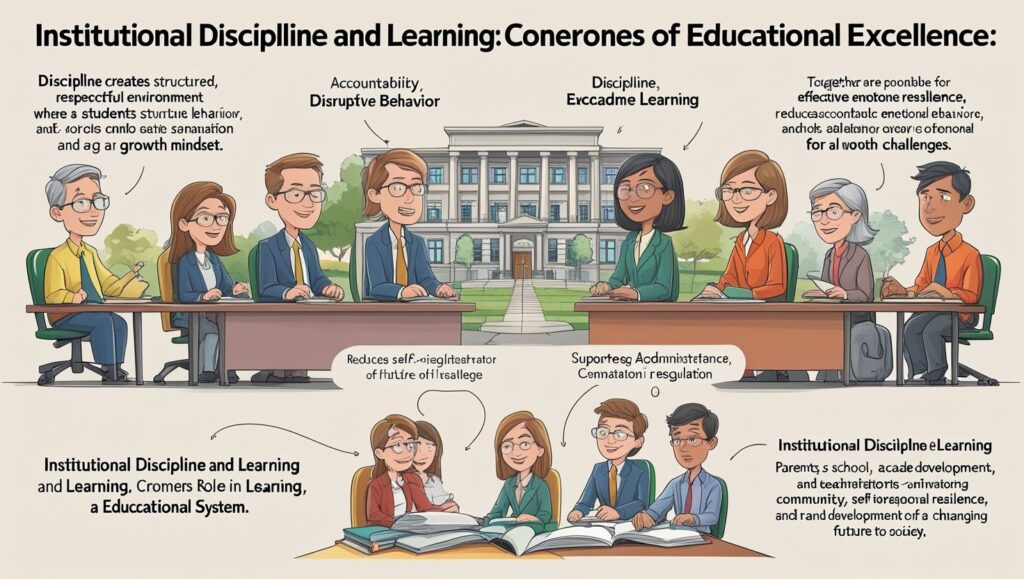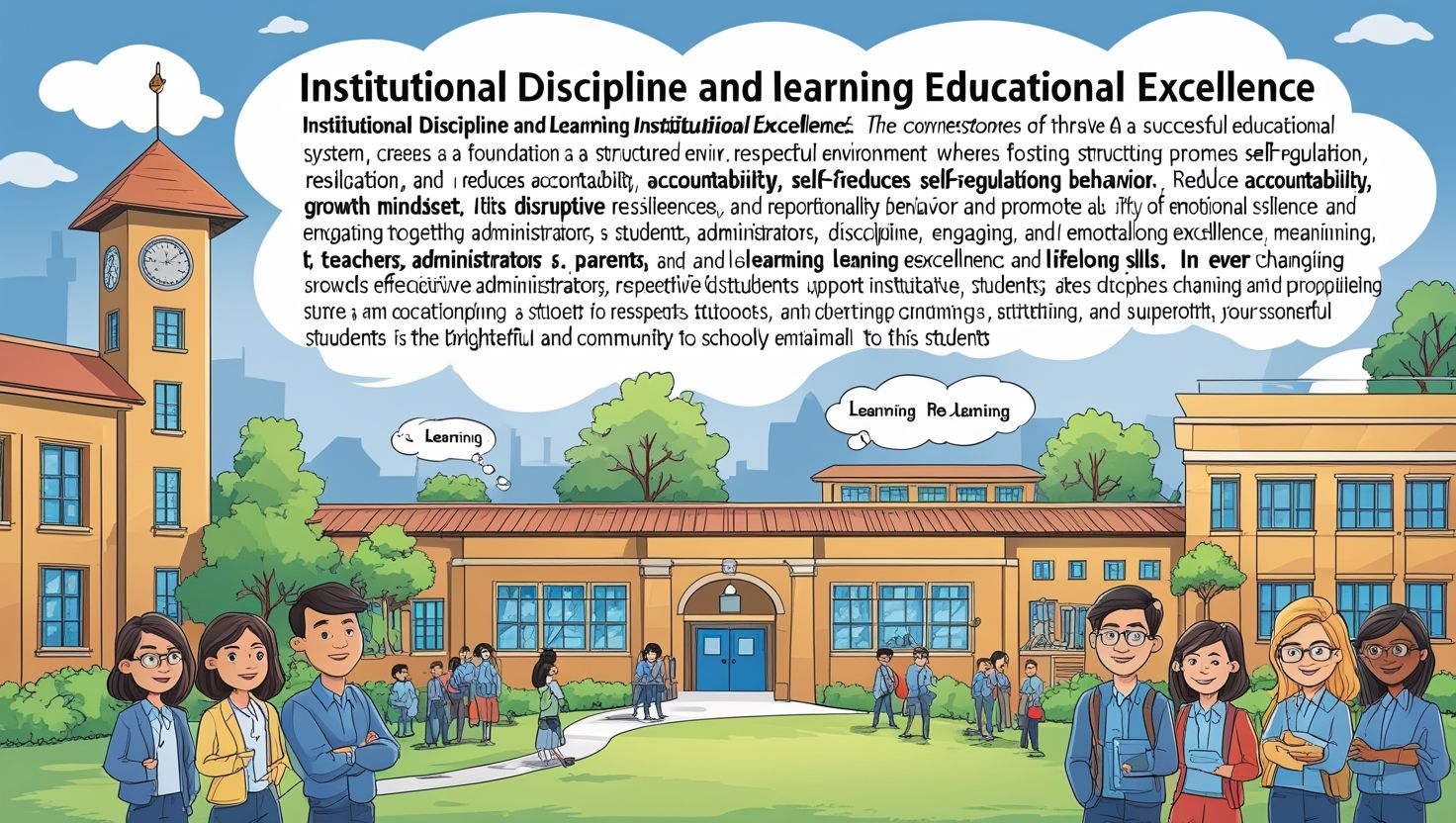Institutional Discipline and Learning: The Cornerstones of Educational Excellence, Institutional discipline and learning are two fundamental pillars that underpin the success of any educational system. They are interdependent, with discipline providing the structure necessary for effective learning, and learning, in turn, reinforcing the value of discipline. In a world that is increasingly complex and fast-paced, the role of educational institutions in fostering both discipline and learning has never been more critical. This article explores the importance of institutional discipline, its impact on learning, and how the two together create an environment conducive to academic and personal growth.
The Concept of Institutional Discipline
Institutional discipline refers to the set of rules, norms, and practices that govern behavior within an educational institution. It encompasses everything from punctuality and attendance to adherence to academic integrity and respect for peers and faculty. Discipline is not merely about enforcing rules; it is about creating a culture of responsibility, accountability, and self-regulation.
Discipline in educational institutions serves several purposes. First, it ensures order and predictability, which are essential for creating a stable learning environment. When students know what expected of them, they are more likely to focus on their studies and less likely to be distracted by disruptive behavior. Second, discipline helps instill values such as respect, honesty, and perseverance, which are crucial for personal and professional success. Finally, discipline prepares students for the realities of the workplace, where adherence to rules and regulations is often a prerequisite for career advancement.
The Role of Discipline in Learning
Discipline and learning are inextricably linked. A disciplined environment is one where learning can thrive. When students are disciplined, they more likely to attend classes regularly, complete assignments on time, and participate actively in discussions. This, in turn, leads to better academic performance and a deeper understanding of the subject matter.
Moreover, discipline fosters a growth mindset. Students who are disciplined more likely to view challenges as opportunities for growth rather than as insurmountable obstacles. They are also more likely to develop effective study habits, such as time management and goal setting, which are essential for long-term academic success.
Institutional discipline also plays a crucial role in shaping students’ attitudes toward learning. When students see that their institution values discipline, they are more likely to take their studies seriously and to view education as a privilege rather than a burden. This positive attitude toward learning can have a ripple effect, leading to higher levels of engagement, motivation, and achievement.
The Impact of Institutional Discipline on Student Behavior
One of the most significant benefits of institutional discipline is its impact on student behavior. A well-disciplined institution is one where students feel safe, respected, and valued. This, in turn, creates a positive school climate, which is essential for both academic and social-emotional development.
Discipline helps reduce instances of bullying, harassment, and other forms of disruptive behavior. When students understand that such behavior will not be tolerated, they less likely to engage in it. This not only creates a more inclusive and supportive environment but also allows teachers to focus on teaching rather than on managing behavior.
Furthermore, discipline helps students develop self-control and emotional regulation. These skills are essential for navigating the challenges of adolescence and for building healthy relationships with peers and adults. By promoting self-discipline, educational institutions help students develop the resilience and coping skills they need to succeed in life.

The Role of Teachers and Administrators in Promoting Discipline
Teachers and administrators play a critical role in promoting institutional discipline. They are responsible for setting clear expectations, modeling appropriate behavior, and enforcing rules consistently and fairly. When teachers and administrators are consistent in their approach to discipline, students are more likely to take the rules seriously and to internalize the values they represent.
However, promoting discipline is not just about enforcing rules; it is also about building relationships. Teachers and administrators who take the time to get to know their students and to understand their individual needs and challenges are more likely to create a positive and supportive learning environment. This, in turn, makes it easier to enforce discipline in a way that is respectful and constructive.
Professional development for teachers and administrators is also essential for promoting institutional discipline. Training in areas such as classroom management, conflict resolution, and restorative justice can help educators develop the skills they need to create a disciplined and inclusive learning environment.
The Role of Parents and the Community
While educational institutions play a central role in promoting discipline, parents and the broader community also have an important part to play. Parents can support institutional discipline by reinforcing the values and behaviors that taught in school. This includes setting clear expectations at home, monitoring their children’s progress, and working collaboratively with teachers and administrators to address any issues that arise.
The broader community can also contribute to institutional discipline by providing resources and support for schools. This might include funding for extracurricular activities, mentoring programs, or initiatives aimed at promoting positive behavior. When schools, parents, and the community work together, they create a powerful network of support that helps students succeed both academically and personally.
The Challenges of Maintaining Institutional Discipline
While the benefits of institutional discipline are clear, maintaining it is not without its challenges. One of the biggest challenges is balancing discipline with flexibility. While it is important to have clear rules and expectations, it is also important to recognize that students are individuals with unique needs and circumstances. Striking the right balance between consistency and flexibility is essential for creating a disciplined yet compassionate learning environment.
Another challenge is addressing the root causes of disruptive behavior. While it is important to enforce rules, it is equally important to understand why students are behaving in a certain way. This might involve addressing issues such as poverty, trauma, or mental health challenges, which can have a significant impact on student behavior. By taking a holistic approach to discipline, educational institutions can address the underlying causes of disruptive behavior and create a more supportive and inclusive environment.
The Future of Institutional Discipline and Learning
As we look to the future, the importance of institutional discipline and learning will only continue to grow. In a world that is increasingly interconnected and rapidly changing, the ability to learn and adapt is more important than ever. Educational institutions that prioritize discipline and learning will better equipped to prepare students for the challenges and opportunities of the 21st century.
Technology will also play an increasingly important role in shaping the future of institutional discipline and learning. Digital tools and platforms can help educators track student progress, provide personalized feedback, and create engaging and interactive learning experiences. However, it is important to remember that technology is a tool, not a substitute for the human connection and support that are essential for fostering discipline and learning.
Conclusion
Institutional discipline and learning are the cornerstones of educational excellence. Together, they create an environment where students can thrive academically, socially, and emotionally. By promoting discipline, educational institutions help students develop the skills and values they need to succeed in life. By fostering a love of learning, they inspire students to reach their full potential and to make a positive contribution to society.
As we navigate the challenges and opportunities of the 21st century, the importance of institutional discipline and learning cannot be overstated. By prioritizing these two pillars, we can create a brighter future for our students and for society as a whole.

11 thoughts on “Institutional Discipline and Learning: The Cornerstones of Educational Excellence”
Comments are closed.